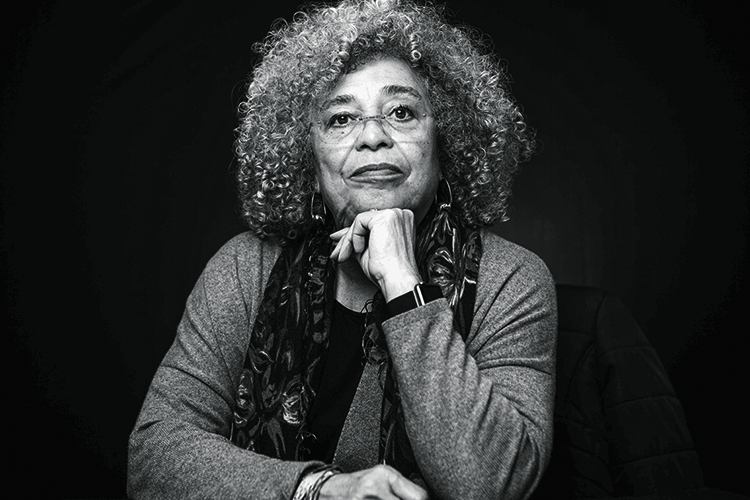Almost 47 years later: recollections and comparisons
For the fifth time in Colgate history, activist, academic, and author Angela Davis delivered a lecture for the University community when she served as the Feb. 4 keynote speaker for the 2021 Martin Luther King Jr. celebration.
When Davis first visited Colgate on Sept. 16, 1974, her talk focused on prison reform — which was also a central theme in this year’s Q&A. But the atmosphere looked much different in the two events taking place almost 47 years apart. This year, approximately 800 attendees listened to Davis over Zoom. In 1974, students formed a long line from Memorial Chapel to East Hall, holding tickets that cost $1.50 each.
“She had her big Afro, and she was very statuesque,” remembers Robert Gordon ’78, who was a first-year student then. “She was low key and gentle in the way she spoke. It was professorial, very intellectual.”
Those were revolutionary times, Gordon points out, citing the Vietnam War protests as well as the rise in the civil rights movement, feminism, and LGBTQ activism.
At the forefront of Davis’ mind that September: the trial of several Black men who were accused of crimes related to the 1971 Attica prison uprising. That event — and the subsequent trials — exposed inhumane prison conditions and civil rights violations. In the chapel that evening, she asked audience members to become involved in their cause and for someone to head the Colgate chapter of the Attica Brothers Defense Group.
Without hesitation, Gordon stood up and volunteered. “The Attica situation was something we were all aware of and something that had purpose at the time,” says Gordon, who’s since dedicated his career to the law as a judge and now partner with the Maryland firm Lerch, Early & Brewer. “We all felt it was a big moment in history. There’s right and there’s wrong, just to simplify it, and we should all be on the side of right.”
Before the chapel event, Gordon attended “a more relaxed, interactive conversation” with Davis in ALANA. This year, too, Davis spent time with students in a smaller group setting — but, of course, it took place online rather than the intimate environment of ALANA.
Jaritza Núñez ’21, who says she has “always admired Angela Davis and her work,” was one of the participants in this year’s student session. Núñez was also chosen to kick off the keynote event by introducing the moderator, ALANA Director Esther Rosbrook. During that Q&A discussion, for which attendees were encouraged to submit questions, Núñez asked Davis about the future of the prison abolition movement.
Davis responded: “For so long, I assumed that the work we were doing against the prison industrial complex, to build an abolitionist movement … was an aspirational expression. I don’t think we ever thought, in our wildest imagination, that abolition would enter the mainstream discourse.”
But, she noted, “there is a new collective sense of the damage that racism has done to the structures of all the institutions in our society… this is a moment where we get to act on that awareness and begin to look deeply at institutions — educational institutions, health care, and of course, all the policing and prisons.”
Davis added: “It gives us the capacity to ask, ‘Well, if we don’t need police in the way we usually think we do, what do we need?’” Her proposed solutions include improved police training, especially in situations where people need help, like mental health crises and domestic disputes.
Having been an activist for so many decades, Davis provides a broad perspective. For Núñez, Davis’ ability to “connect past struggles to current social justice movements” particularly resonated. “Davis spoke about the need to be aware of the effects of the past and present while also thinking about the future and being aspirational about what could be accomplished or acquired,” Núñez said in the Maroon-News. “This was an important point because if we do not allow ourselves to imagine how things need to and can change, then we are limiting our activism.”
Gordon remembers, in 1974, “there was a feeling that there is going to be change in America,” he says. “In 40 years, it’ll be a dramatically different America where there won’t be any racism, or it’ll be reduced to the tiniest element,” he recalls thinking. “Of course, some of that happened, but the dream wasn’t realized.” As social justice efforts march on, Gordon says it’s meaningful to have someone like Angela Davis address the campus community and speak to students on a personal level.
Looking back to his 17-year-old self as a student of color, he will never forget feeling something powerful in Davis’ presence: “like a loved human being, valued just like anybody else in this country.”

